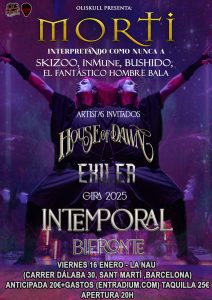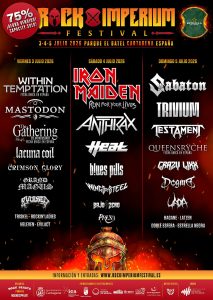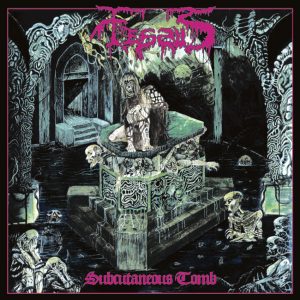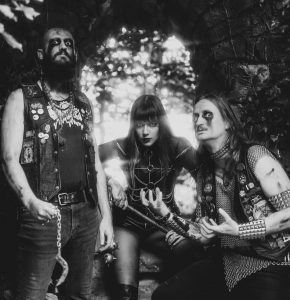INTERVIEW: PALANTYR: Climbing Through Shadows (a battle cry for the soul in a fractured world)

What does it mean to ascend—not just musically, but personally, politically, spiritually? In this raw, multifaceted interview with French heavy metal force Palantyr, we dive into the layers beneath The Ascent & The Hunger, an album that’s not just a split between light and dark, but a mirror to our world and the struggles within it.
From Hungarian mythology to anti-colonial allegories, from the loneliness of immortality to the modern pressure to never stop, Palantyr opens up about their creative process, emotional core, and the fight to keep classic metal vital, inclusive, and rebellious. This isn’t just about riffs and speed—it’s about identity, integrity, and the hunger that drives us through the chaos.
First off, thanks for taking the time to talk with us. The Ascent & The Hunger feels like a raw battle between light and dark. What do you hope listeners take away from the album’s duality of speed and melody?
Hello, this album is more to be taken as a collection of two EPs with different moods. The Ascent is a more epic, atmospheric ensemble of songs, while The Hunger is a darker set of earlier material. That brings this feel of duality, I guess.
Speed metal often represents a rush of adrenaline and energy. How do you think this genre reflects our society today—especially in terms of the constant pressure to move faster, do more, and never stop?
To me, speed metal belongs to a specific fraction of time, which is the ’80s, indeed where you had to push and struggle, to quote Killing Joke. It seems that people nowadays turn more and more to the past, and that brings the genre back to light.
In “Nosferatu,” you took a classic and reimagined it as a high-speed anthem. Why did you choose this particular track, and what does it mean to breathe new life into something so iconic?
We wanted to honor Mr. Roland, pretty obscure in the metal scene, by doing a cover of one of his earlier materials, also to show that our influences are rooted beyond classic metal. We were hesitating between this one and Twilight of the Gods. Nosferatu was a slightly more ambitious choice as we had to take into account the keys, the tempo, etc. The idea was really to reinterpret the song with our own touch, and not just do a 1:1 cover.
Metal often portrays intense emotions, from rage to despair. How does The Ascent & The Hunger tap into these emotions, and do you think music is an effective way to address complex, uncomfortable feelings that society often ignores?
Of course, music is essential to drive emotions—this is actually the most essential medium. You have words, you have voice, image, and you have music. Depending on what keys you play, the music will breathe drama or melancholia when you play minor keys, and in opposition, sound strong and bright when you play major keys. The way I write my riffs is mainly in minor, which reflects pretty much the climax in the songs.
The title of the album suggests an ongoing struggle. Do you think the hunger for success or self-fulfillment is something that can ever be truly satisfied, or is it part of the human condition?
Well, The Ascent was more like a statement, arising from the bowels of nothingness to the highest peak of a mountain. The Hunger is more thematic. It’s not a concept, but the songs we picked have a darker climax. “Ravenous” is about cannibalism through the Native American legend of the Wendigo, and in the film that inspired the song, there is a subtext denouncing colonialism. Nosferatu‘s lyrics focus more on the idea that the vampire suffers from the loneliness induced by his immortality, the endless repetitive days, and that there’s no point in nurturing friendships since they all end up dying.
“Son of the White Mare” has such an epic feel to it. Is there a personal connection to these themes of mythology and heroism, or do you see this song as a metaphor for something deeper, like the eternal battle within oneself?
Son of the White Mare has its roots directly in old Hungarian folklore. It is indeed a metaphor to transfer values—strength, victory through unity, righteous path, etc.
Music, particularly in heavy genres like metal, is sometimes criticized for not being inclusive or diverse enough. What role do you think bands like Palantyr can play in changing the conversation about inclusivity in the metal scene?
We are of course very proud to do our part, and we really hope Palantyr can give the willingness to many talented women to step in and prove that metal is not about identity of gender but about musical identity.
There’s a sense of rebellion and self-determination throughout The Ascent & The Hunger. What do you think about the idea of ‘ascending’ or ‘rising above’ societal norms—do you see metal as a tool for personal liberation?
As I explained above, The Ascent was a statement to show the band’s willingness to rise above its previous works (Destrukt Era). Metal has long been a counter-culture in response to the normality of pop music. It is still a good way to express your personality and to somewhat help you find your way in life. However, not every metal is an example to follow. As soon as it promotes an ideology—religious, satanic, or political—you better have a strong free will if you don’t want to be captive.
Thank you for this conversation! Before we wrap up, is there anything else about The Ascent & The Hunger that you want to share with your listeners or any personal message you’d like to pass on through your music?
Thank you for your time. We want to tell our listeners that there are still flamekeepers for classic metal out there, that speed or heavy metal is not a matter of generation or nostalgia, but something well alive and still inventive.








